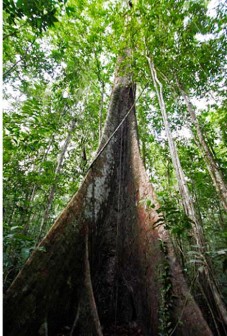Forces favouring forest destruction—including food and fuel prices—could overwhelm efforts aimed at preserving what remains of the world’s rainforests, according to the Japan-based International Tropical Timber Organization (ITTO).
According to the recently-concluded comprehensive assessment of tropical forest management, while enhanced global emphasis of forest conservation has resulted in a 50 per cent growth in tropical forest under sustainable management, economic imperatives that make deforestation attractive to some business interests continue to pose a threat to conservation in the long term. “More than 90 per cent of the global tropical forest estate continues to be managed poorly or not at all,” the report says.

The ITTO report draws on detailed data culled from 33 countries, including Guyana, which, it says, control almost all of the world’s tropical forests and tropical timber production.
Guyana is named among some countries in the South America, Africa and Asia that have “made notable progress towards sustainable forest management in the last five years” by implementing forest-related policies, laws and regulations, relatively clear tenure regime and strong institutions” while improving forest law enforcement on the ground. The report names other countries including neighbouring Suriname which it says “have endured major conflicts in recent decades that have hindered the development of the institutions and local actions required to achieve sustainable forestry management.
Just how much the world’s forest-producing countries depend on forest depletion to boost their economies is reflected in the fact that overall revenue earnings are valued at well over US$20 billion. Earnings from both felled timber, in the case of countries like Guyana and value-added products including furniture from Asia contribute both to the growth of the private sector in producing countries and to subsistence living among poorer countries.
In recent years, the threat of a global food crisis has increased the prospects of increased land-clearing in forested areas to expand food production while in several South American countries including Guyana and Suriname, state-driven forest conservation laws are creating tensions between the privately-run gold-mining sector and the state authorities.
The ITTO report, titled ‘Status of Tropical Forest Management 2011’, states that over the past five years the area of natural tropical forest under sustainable management across Africa, Asia, the Pacific, Latin America and the Caribbean increased from 36 million hectares to 53 million hectares. Additionally, the area of timber production subject to at least some type of management plan has increased by about one third since 2005 and now totals 131 million hectares.
For poor countries there may well be a downside to stricter forest conservation since the ITTO says that while it supports the emergence of new markets for “green timber”, demand for certified wood is likely to affect only a small part of the overall tropical forest estate. “Countries are embracing forest programmes related to climate change because they expect them to generate a significant amount of money which may not materialize to the extent hoped for,” the ITTO says.
The ITTO says that tropical forests have been under increasing threat for several decades with millions of hectares being cleared annually for agriculture, pastures and other non-forest uses. Other forested areas are being degraded by unsustainable or illegal logging and other poor land-use practices.
However, the report acknowledges that new efforts have been made in the last five years to halt or at least slow the pace of forest destruction. These include negotiations in global climate change forums to generate funds for reducing emissions from forest destruction and degradation (REDD), which account for 10-20 per cent of greenhouse gas emissions globally. Additionally, new laws and regulations have been introduced in the United States, Europe, Japan and elsewhere to block or at least restrict imports of illegally-harvested timber.
ITTO reports that 26 of the 33 surveyed countries are participating in at least one REDD-related initiative, including the Forest Carbon Partnership Facility, UN-REDD, the Forest Investment Programme, the Global Environment Facility, ITTO’s own REDDES, and several other major bilateral programmes.









